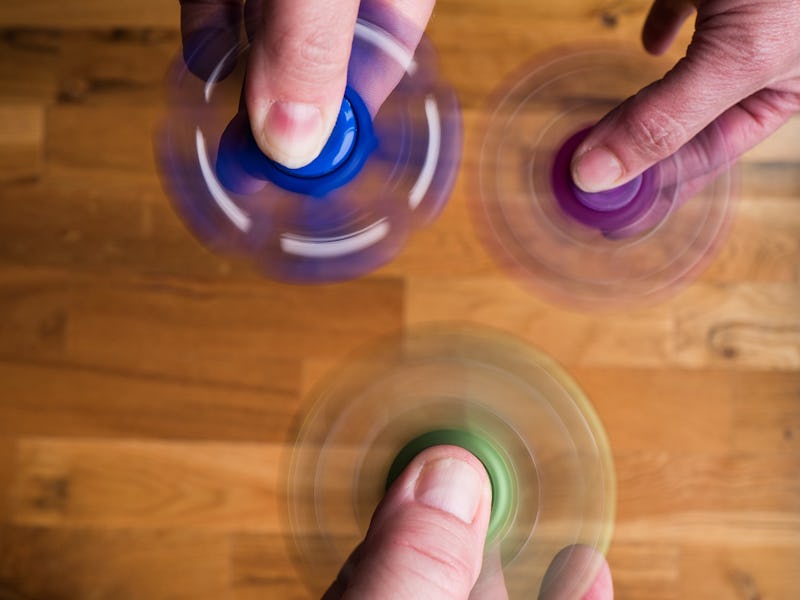The Government's Fidget Spinner Warning for Killer Teens
The Consumer Product Safety Commission wants us to practice safe spinning.

Thanks to a hilarious message tweeted on Friday by the U.S. Consumer Product Safety Commission, I will never put another fidget spinner in my mouth.
You can find fidget spinners for sale all over the nation, from gas stations to outdoor supply stores to Barnes & Noble. Basic models generally retail for around $10, a price just low enough that you can convince yourself that you’re making a reasonable purchase. I have personally spent $35 on fidget spinners, but I swear that one of them was a gift for a friend.
No matter how you feel about them, it is undeniable that they are a cultural phenomenon in the vein of Livestrong bracelets and hoverboards.
That’s where the Consumer Product Safety Commission (or CPSC) enters the equation. The commission is a regulatory agency tasked with informing the product about risks associated with certain products, like ATVs, fireworks and coffee makers. Though the organization does important work, its social media presence has a unique voice that seems, at times, at odds with the serious nature of its subject matter.
In a shining example, the ubiquitous nature of fidget spinners prompted the CPSC’s Twitter account to issue this warning about the choking hazards associated with the toys:
It is the perfect tweet.
It informs the reader. It understands the reader.
In order to understand how a government Twitter feed could feel so subversive and funny, Inverse spoke with Joseph Galbo, the man behind the CPSC’s social media accounts. He told us how he crafted the tweet, and he took us on an introspective joyride into his psyche.
“We use a stock photo account to make the majority of our social media graphics and the fidget spinner selection was pretty limited,” Galbo said.
Ah, the joys of corporate life!
“When I first saw the picture of the kid in sunglasses, duel-wielding fidget spinners, I thought, ‘Well, this is a little ridiculous.’ Then the more I looked at it, the more I was like, “Wait a second, what if he has it all figured out and it’s me who isn’t living?”” From there, Galbo crafted an upbeat spin on this safety issue. The kid in the stock photo playing with fidget spinners was, to Galbo, simply “living his truth”.
“Once I started approaching it with that positive perspective, it took me down the road of the concept of “living your truth” and being yourself, but doing it safely,” he said. “It revealed a fun opportunity to educate and entertain people at the same time, and that’s my favorite way to communicate.”
Galbo has authored other great tweets on the dangers of not replacing your smoke alarm batteries or inattentive behavior while cutting up avocados. He also puts together the accompanying graphics, which definitely add another dimension to the CPSC’s safety recommendations. Galbo posting his earnest creations on Twitter, driven largely by ironic or satirical content, makes the CPSC’s feed look like a work of subversive dark comedy, though it’s not.
“Since we’re so small we’re always looking for unique ways to reach people,” Galbo said. “And social media is a great space to be a little different.”
The feed reads like a really helpful fever dream. It is a master class in absurdist humor. And most importantly of all, it is comedy as an act of public service- it exists to protect the American consumer from the pitfalls of the products that we love.
See also: Here’s why Twitter is suing the Trump administration